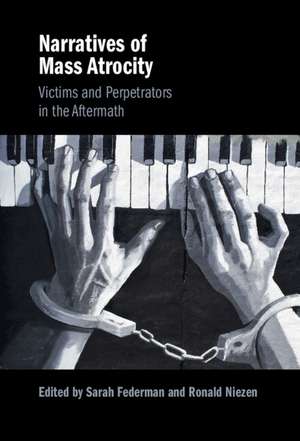Narratives of Mass Atrocity: Victims and Perpetrators in the Aftermath
Editat de Sarah Federman, Ronald Niezenen Limba Engleză Hardback – 7 sep 2022
Preț: 703.24 lei
Preț vechi: 817.72 lei
-14% Nou
Puncte Express: 1055
Preț estimativ în valută:
134.58€ • 139.99$ • 111.11£
134.58€ • 139.99$ • 111.11£
Carte tipărită la comandă
Livrare economică 15-29 aprilie
Preluare comenzi: 021 569.72.76
Specificații
ISBN-13: 9781009100298
ISBN-10: 1009100297
Pagini: 278
Dimensiuni: 158 x 235 x 26 mm
Greutate: 0.67 kg
Ediția:Nouă
Editura: Cambridge University Press
Colecția Cambridge University Press
Locul publicării:Cambridge, United Kingdom
ISBN-10: 1009100297
Pagini: 278
Dimensiuni: 158 x 235 x 26 mm
Greutate: 0.67 kg
Ediția:Nouă
Editura: Cambridge University Press
Colecția Cambridge University Press
Locul publicării:Cambridge, United Kingdom
Cuprins
Introduction: Narrative in the aftermath of mass atrocity Sarah Federman and Ronald Niezen; 1. Guilt, responsibility and the limits of identity Diane Enns; 2. Victim, perpetrator, hero: The French national railway's idealized war identities Sarah Federman; 3. Deconstructing the complexities of violence: Uganda and the case against Dominic Ongwen Ayodele Akenroye and Kamari Maxine Clarke; 4. Rehabilitating guerillas in neo-extractivist guatemala Karine Vanthuyne and Marie-Christine Dugal; 5. The road to recognition: Afro-Uruguayan activism and the struggle for visibility Debbie Sharnak; 6. Justice in translation: Uncle Meng and the trials of the foreign Alex Hinton; 7. Memory and victimhoods in post-genocide rwanda: Legal, political and social realities Samantha Lakin; 8. Imaging traitors: The raped woman and sexual violence during the Bangladesh war of 1971 Nayanika Mookerjee; 9. Open source justice: Digital archives and the criminal state Ronald Niezen; 10. Left unsettled: Confessions of armed revolutionaries Leigh Payne; 11. Victims and perpetrators in reconciliation systems design Daniel L Shapiro and Vanessa Liu; Afterword Sarah Federman; Index.
Recenzii
'We think we have a good understanding of the role narratives of hate, degradation, and demonization play in setting the conditions for mass atrocities and genocidal violence. We know far less about the role narratives continue to play in their aftermath. Roles such as victim, perpetrator, hero, and traitor seem self-evident and fixed. They are not, these authors argue. Yesterday's hero is today's perpetrator, yesterday's perpetrator is sometimes also a victim, and yesterday's perpetrator is tomorrow's hero. Using rich case studies, these chapters deepen our understanding of post-atrocity narrative, by deconstructing the roles of victim and perpetrator, and unsettling the “security of binaries” on which the conception of these roles, our understanding of “what happened”, and our missions in transitional justice, reconciliation, and peacebuilding, all depend. The cost of ignoring the force of post-atrocity narrative is the risk of setting the conditions for the next wave of incitements and violence.' Kevin Avruch, Jimmy and Rosalynn Carter School of Peace and Conflict Resolution, George Mason University
'Federman and Niezen's bold introduction to this volume forces us to confront the bitter reality that discourse, in the aftermath of mass violence, is overrun with brittle, self-serving narratives that deepen harm and complicate the path to healing. A remarkably diverse set of cases illustrates this point and offers evidence of how novel language, non-binary thinking, and innovative technology combine to forge new narrative ecologies where the stories told have a chance of promoting peace. Bravo!' Susan F. Hirsch, Vernon M. and Minnie I. Lynch Chair of Conflict Analysis and Anthropology, George Mason University
'Federman and Niezen's bold introduction to this volume forces us to confront the bitter reality that discourse, in the aftermath of mass violence, is overrun with brittle, self-serving narratives that deepen harm and complicate the path to healing. A remarkably diverse set of cases illustrates this point and offers evidence of how novel language, non-binary thinking, and innovative technology combine to forge new narrative ecologies where the stories told have a chance of promoting peace. Bravo!' Susan F. Hirsch, Vernon M. and Minnie I. Lynch Chair of Conflict Analysis and Anthropology, George Mason University
Descriere
Offers a narrative approach to post-conflict intervention, showing how legalism following mass violence encourages dangerous binaries.
